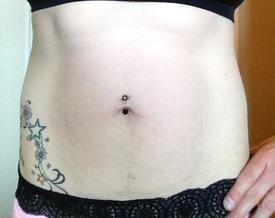Determining TDEE?
Options

lilsassymom
Posts: 407 Member
How do you determine TDEE? I have my profile set to lightly active and MFP set it as a net calorie goal of 1200 to lose 1 lb a week. I am 5'1 and currently 133 lbs and according to MFP my BMR is 1259. Do you think 1200 is too low?
Maybe I am just not seeing where to find it? Forgive me as I am fairly new to this site. I am confused about BMR and TDEE...
Maybe I am just not seeing where to find it? Forgive me as I am fairly new to this site. I am confused about BMR and TDEE...
0
Replies
-
Go to goals and you will find it there as Calories burned from normal daily activity.0
-
If you put all your information into MFP accurately, it will have figured this all out for you.
However. If you're curious to know what your TDEE is - Google it. There are quite a few websites out there that have a TDEE calculator on them. It'll ask for your height, weight and activity level. Then it'll figure it out for you.
My BMR is 1338. My TDEE is 2449. My calorie deficit should be taken from the 2449 and NOT from the 1338. (BTW, I think mine is pretty accurate because I maintain consuming 2300-2500 net calories and when I was actively losing weight - I was consuming 2100-2200 net calories and losing about .5lbs a week. That means it was roughly a 250 calorie deficit from my TDEE).
According to everything I've read/heard - you shouldn't eat below your BMR. The calorie deficit should be created from your TDEE and NOT from your BMR. Your BMR is the basic number of calories your body needs to simply survive - create a deficit from that for a long period of time and well.. your body thinks it is gonna starve to death.0 -
This is a cool gadget I use once in a while:
http://www.health-calc.com/diet/energy-expenditure-advanced0 -
Thanks. It says 1700Go to goals and you will find it there as Calories burned from normal daily activity. . 0
. 0 -
If you edit your goals to "maintenance" instead of losing weight, it will tell you your TDE. 1259 does sound low, but it's likely because you are smaller!0
-
If you edit your goals to "maintenance" instead of losing weight, it will tell you your TDE. 1259 does sound low, but it's likely because you are smaller!
Being smaller doesn't always mean less calories. I'm 145lbs and eat in the 2300-2500 net calorie range. So, not everyone on the smaller side needs lower calories. It depends on your activity level. If you weigh 145lbs and are basically sedentary you'll consume less than someone who is 145lbs and active or very active.0 -
So according to MFP my BMR is 1259....so does that mean that my net calories should be above 1200?
MFP set me to 1200 net calories to lose 1 lb a week. I am just wondering if I should up my calories to be above my BMR (1259) BUT below my TDEE (1700) in order to lose weight more efficiently...Yeah I am a newbie . 0
. 0 -
So according to MFP my BMR is 1259....so does that mean that my net calories should be above 1200?
MFP set me to 1200 net calories to lose 1 lb a week. I am just wondering if I should up my calories to be above my BMR (1259) BUT below my TDEE (1700) in order to lose weight more efficiently...Yeah I am a newbie .
.
If I were you, I would adjust my settings with MFP to lose .5lbs a week vs 1lb a week. When you get down closer to your goal weight, losing 1lb a week gets more difficult (and usually severely restricts your calories). I would try changing it to .5lb a week and see where MFP moves your calories.0 -
Chevy is right on the money.
Also, you can always try other sites to calculate TDEE, BMR, BMI, etc: http://www.fitnessfrog.com/calculators/tdee-calculator.html
Please remember that MFP is not the be-all, end-all of weight loss advice and that you can find other reliable sites to calculate the numbers you need to safely lose weight.
And finally, things change after time. You may find that after you lose a lot of weight and stall out, you will need to adjust your settings/goals to accommodate your faster metabolism. When you do, EAT MORE.
Good luck!0 -
I would check out a TDEE calculator that isn't on this site. I recently saw a nutritionist, who upped my calories to 1600. I feel so much better. 1200 was too low for me. I was tired throughout the day. I'm small too, 5'1. And with the exception of my workouts, I am not that active.
It may take some tweaking, but listen to your body. You'll find the right calorie goal : )0 -
So according to MFP my BMR is 1259....so does that mean that my net calories should be above 1200?
MFP set me to 1200 net calories to lose 1 lb a week. I am just wondering if I should up my calories to be above my BMR (1259) BUT below my TDEE (1700) in order to lose weight more efficiently...Yeah I am a newbie .
.
Where your weight is you should eat at no more that a 500 calorie a day deficit. 250 would even be better.
http://www.myfitnesspal.com/topics/show/61706-guide-to-calorie-deficits0 -
Ok so I adjusted my settings this morning with MFP to lose .5 lbs a week. I now have a net calorie of 1450. Do most people see a weight gain when they adjust/up their calories. Should I expect it, and if so how long til my weight will go back down? Thanks...So according to MFP my BMR is 1259....so does that mean that my net calories should be above 1200?
MFP set me to 1200 net calories to lose 1 lb a week. I am just wondering if I should up my calories to be above my BMR (1259) BUT below my TDEE (1700) in order to lose weight more efficiently...Yeah I am a newbie .
.
If I were you, I would adjust my settings with MFP to lose .5lbs a week vs 1lb a week. When you get down closer to your goal weight, losing 1lb a week gets more difficult (and usually severely restricts your calories). I would try changing it to .5lb a week and see where MFP moves your calories.0 -
Ok so I adjusted my settings this morning with MFP to lose .5 lbs a week. I now have a net calorie of 1450. Do most people see a weight gain when they adjust/up their calories. Should I expect it, and if so how long til my weight will go back down? Thanks...So according to MFP my BMR is 1259....so does that mean that my net calories should be above 1200?
MFP set me to 1200 net calories to lose 1 lb a week. I am just wondering if I should up my calories to be above my BMR (1259) BUT below my TDEE (1700) in order to lose weight more efficiently...Yeah I am a newbie .
.
If I were you, I would adjust my settings with MFP to lose .5lbs a week vs 1lb a week. When you get down closer to your goal weight, losing 1lb a week gets more difficult (and usually severely restricts your calories). I would try changing it to .5lb a week and see where MFP moves your calories.
Yes, it is very common to see a weight gain when you increase your calories. It is normal. It is temporary. Please, give your body a few weeks (I say a month is good) to adjust to the changes you're making. Give it time. Don't expect results overnight. It'll take some time. For most people, the weight will drop back off within that month.0 -
I think MFP is low...according to it my calories burned from daily activity is 1760. I've set my net to 1800 and I'm still losing weight. I've used other sources and my TDEE is around 2200. You just need to play around with it some...I've had to keep upping my cals, and I'm still losing - go figure!0
-
Here is the formula I use for my clients.
Total Body Weight x % Body Fat = Pounds (or Kilograms) of Body Fat
Total Body Weight - Pounds (or Kilograms) of Body Fat = Lean Body Mass (If using pounds, divide by 2.2 before moving to the next step to convert to kilograms)
Lean Body Mass x 24 = BMR
BMR x Activity Factor = Total Energy Expenditure Not Counting Exercise
TEE + Exercise Calories = TDEE
Activity Factors
Sedentary = 1.2
Lightly Active = 1.3
Moderately Active = 1.5
Highly Active = 1.7
Extremely Active = 1.9
For Weight Loss Subtract NO MORE THEN 20% of TDEE per day. So, if your TDEE (after exercise is added) is 2000 calories, then you should eat no less then 1600 calories (2000 x 20% = 400).0 -
If you put all your information into MFP accurately, it will have figured this all out for you.
However. If you're curious to know what your TDEE is - Google it. There are quite a few websites out there that have a TDEE calculator on them. It'll ask for your height, weight and activity level. Then it'll figure it out for you.
My BMR is 1338. My TDEE is 2449. My calorie deficit should be taken from the 2449 and NOT from the 1338. (BTW, I think mine is pretty accurate because I maintain consuming 2300-2500 net calories and when I was actively losing weight - I was consuming 2100-2200 net calories and losing about .5lbs a week. That means it was roughly a 250 calorie deficit from my TDEE).
According to everything I've read/heard - you shouldn't eat below your BMR. The calorie deficit should be created from your TDEE and NOT from your BMR. Your BMR is the basic number of calories your body needs to simply survive - create a deficit from that for a long period of time and well.. your body thinks it is gonna starve to death.
I am so confused by the TDEE too. Even after reading all the posts. I feel like I just can't wrap my brain around it. I just used the TDEE calculator on http://www.health-calc.com/diet/energy-expenditure-advanced and it says my BMR is 1,692 and my TDEE is 3,300.... MFP has me eating 1200 calories (before exercise). I am 5'4 and 179 and have my goal set to lose 2 lbs per week since I have about 40 lbs left to lose but even when I set it to 1.5 per week it stays at 1200. If I am supposed to use my TDEE to determine my deficit then I would be way under that. I wasn't eating my exercise calories and I have gradually been trying to eat more of them b/c everything I read makes me feel like I am eating too little even though I feel like I eat plenty and sometimes it's hard for me to eat enough each day. I don't want to sabatoge myself by eating too little.0 -
Activity Factors
Sedentary = 1.2
Lightly Active = 1.3
Moderately Active = 1.5
Highly Active = 1.7
Extremely Active = 1.9
For Weight Loss Subtract NO MORE THEN 20% of TDEE per day. So, if your TDEE (after exercise is added) is 2000 calories, then you should eat no less then 1600 calories (2000 x 20% = 400).
I'm OK with calculating this number, but where I get confused is whether or not to eat back my exercise calories. I work out 4 times a week so if I use a moderately active calcuation I get a TDEE of 1963 (close enough to your calculation above). So in theory I should be eating 1600 calories even on days I'm exercising? If I use the sedentry factor I'm only at a TDEE of 1713 calories giving me 1370 calories for the day. I would assume that THEN I could eat my exercise calories back. Am I right?
I currently try to net 1600 (5'7" stuck at 153 lbs). 30 min of cardio (no heart rate monitor yet, unless Santa brings me one) but MFP gives me anywhere from 210-270 depending on the equipment - I guess that brings me to approximately the same calorie range either way. But I'm still confused!!0 -
Activity Factors
Sedentary = 1.2
Lightly Active = 1.3
Moderately Active = 1.5
Highly Active = 1.7
Extremely Active = 1.9
For Weight Loss Subtract NO MORE THEN 20% of TDEE per day. So, if your TDEE (after exercise is added) is 2000 calories, then you should eat no less then 1600 calories (2000 x 20% = 400).
I'm OK with calculating this number, but where I get confused is whether or not to eat back my exercise calories. I work out 4 times a week so if I use a moderately active calcuation I get a TDEE of 1963 (close enough to your calculation above). So in theory I should be eating 1600 calories even on days I'm exercising? If I use the sedentry factor I'm only at a TDEE of 1713 calories giving me 1370 calories for the day. I would assume that THEN I could eat my exercise calories back. Am I right?
I currently try to net 1600 (5'7" stuck at 153 lbs). 30 min of cardio (no heart rate monitor yet, unless Santa brings me one) but MFP gives me anywhere from 210-270 depending on the equipment - I guess that brings me to approximately the same calorie range either way. But I'm still confused!!
Okay, is the 1963 before or after adding the exercise calories? If its before, then you need to eat 80% of the exercise calories too. So, if you go with the lowest number on the exercise calories and add that to the 1963 you get a TDEE of 2173. If you multiply that by 80% then you get a minimum calorie intake of 1739 calories. Does that make sense? Basically, eat 80% of the total calories before exercise and 80% of the exercise calories, regardless of which activity factor you use.0 -
Okay, is the 1963 before or after adding the exercise calories? If its before, then you need to eat 80% of the exercise calories too. So, if you go with the lowest number on the exercise calories and add that to the 1963 you get a TDEE of 2173. If you multiply that by 80% then you get a minimum calorie intake of 1739 calories. Does that make sense? Basically, eat 80% of the total calories before exercise and 80% of the exercise calories, regardless of which activity factor you use.
The 1963 is based on the moderate activity factor - I was considering my workouts to be moderate activity. I'm pretty sedentry other than my morning workouts before work. Should I use the 1.2 calculation then? And eat back my exercise calories (which I already do)?0 -
Ok so I adjusted my settings this morning with MFP to lose .5 lbs a week. I now have a net calorie of 1450. Do most people see a weight gain when they adjust/up their calories. Should I expect it, and if so how long til my weight will go back down? Thanks...
Yes, it is very common to see a weight gain when you increase your calories. It is normal. It is temporary. Please, give your body a few weeks (I say a month is good) to adjust to the changes you're making. Give it time. Don't expect results overnight. It'll take some time. For most people, the weight will drop back off within that month.
This is true even for some guys ( maybe all) I am "reverse dieting" to determine my maintenance level and everytime I move my calories up even by 100-150, I gain 3-5 lbs for a week to 10 days then it goes away.0 -
This is a cool gadget I use once in a while:
http://www.health-calc.com/diet/energy-expenditure-advanced
This is a cool gadget however it sure gives me way more calories then MFP says I can have.0 -
Okay, is the 1963 before or after adding the exercise calories? If its before, then you need to eat 80% of the exercise calories too. So, if you go with the lowest number on the exercise calories and add that to the 1963 you get a TDEE of 2173. If you multiply that by 80% then you get a minimum calorie intake of 1739 calories. Does that make sense? Basically, eat 80% of the total calories before exercise and 80% of the exercise calories, regardless of which activity factor you use.
The 1963 is based on the moderate activity factor - I was considering my workouts to be moderate activity. I'm pretty sedentry other than my morning workouts before work. Should I use the 1.2 calculation then? And eat back my exercise calories (which I already do)?
Yes. Exercise doesn't count toward that activity factor because if it did then we'd be eating it twice by adding it again when we exercise. It's more accurate to estimate based on not exercising and then adding in what we burn from each specific workout then to try and add exercise calories to that estimate of activity.0 -
Thanks Tonya. That makes sense now. I'm basing my factor on no exercise and eating back 80% of my exercise cals.0
This discussion has been closed.
Categories
- All Categories
- 1.4M Health, Wellness and Goals
- 396.7K Introduce Yourself
- 44.2K Getting Started
- 260.8K Health and Weight Loss
- 176.3K Food and Nutrition
- 47.6K Recipes
- 232.8K Fitness and Exercise
- 450 Sleep, Mindfulness and Overall Wellness
- 6.5K Goal: Maintaining Weight
- 8.7K Goal: Gaining Weight and Body Building
- 153.3K Motivation and Support
- 8.3K Challenges
- 1.3K Debate Club
- 96.5K Chit-Chat
- 2.6K Fun and Games
- 4.5K MyFitnessPal Information
- 16 News and Announcements
- 18 MyFitnessPal Academy
- 1.4K Feature Suggestions and Ideas
- 3.1K MyFitnessPal Tech Support Questions











